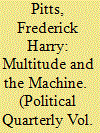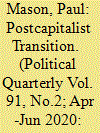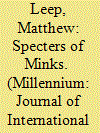|
|
|
Sort Order |
|
|
|
Items / Page
|
|
|
|
|
|
|
| Srl | Item |
| 1 |
ID:
174003


|
|
|
|
|
| Summary/Abstract |
There has been a proliferating literature on postcapitalist and post‐work futures in recent years, underpinned by policy proposals like the basic income and a reduction in working hours. It has gained increasing uptake within left electoral politics and policy making. The generational potency of these ideas require that we understand their theoretical roots. This article considers the interplay between the work of Michael Hardt and Antonio Negri and the new postcapitalism exemplified by the likes of Paul Mason and Aaron Bastani, as well as its relationship with intellectual currents around Corbynism and the wider contemporary left. Through a discussion of their latest book, Assembly, it will be seen that Hardt and Negri both inform, and are increasingly informed by, the postcapitalist and post‐work thinking popular on the left today—in particular at its ‘posthumanist’ fringes. However, this recent work is characterised by a series of tactical redirections that, rather than indicating renewal, reflect the potential collapse of this utopian framework for the future in the face of a rapidly unravelling global political context. Whilst the determinist understanding of social transformation cannot permit these setbacks, this shines a light on more general shifts in left strategy and analysis.
|
|
|
|
|
|
|
|
|
|
|
|
|
|
|
|
| 2 |
ID:
173994


|
|
|
|
|
| Summary/Abstract |
The postcapitalism thesis asserts that open source and collaborative non‐profit organisations represent a new, non‐market sector in which the profit motive and monetary exchange no longer drive economic activity; in Marxist political economy terms, they are a new means for suppressing the law of value. Information technology has produced four systemic dysfunctions, limiting capitalism’s ability to function as a complex adaptive system: the zero marginal cost effect, the tendency to delink work from wages, positive network effects, and information asymmetries. In response, in addition to the traditional remedies of social democracy for a stagnant neoliberal economic model, left parties must adopt a programme of transition: aggressively breaking up technological monopolies; promoting universal basic income and basic service solutions; outlawing rent‐seeking business models; and promoting data democracy.
|
|
|
|
|
|
|
|
|
|
|
|
|
|
|
|
| 3 |
ID:
192199


|
|
|
|
|
| Summary/Abstract |
While narrative approaches in International Relations (IR) have become increasingly prominent, posthumanist narratives of capitalism remain on the margins. Informed by feminist avant-garde poet Susan Howe and philosopher Jacques Derrida, I develop a ‘drift narrative’ approach to human-mink relations during the SARS-CoV-2 pandemic, wherein millions of minks in fur farms were infected by the coronavirus and culled. This approach employs the use of postcapitalist elegies constructed in a wildlife refuge located near a mink factory farm. In a context of global mink culls, the wildlife refuge – where minks live freely – proximate to a local industrial mink fur farm – where minks are caged and killed for profit – became the site of (re)writing IR in drift narrative form. This poetic analysis highlights trans-spatial links of animal capital and employs intermixed elegiac images, sound recordings, and textual fragments to help us become attuned to nonhuman dreams, desires, losses, and futures. Grounding persistence for postcapitalist futures within the dreams of the dead, the drift narrative generates a spectral form of global multispecies solidarity. Contributing to the interspecies and narrative turns in IR, as well as multidisciplinary work on multispecies solidarity, the drift narrative offers an aesthetic and ethical critique of past and future animal capital systems that render more-than-human life as killable.
|
|
|
|
|
|
|
|
|
|
|
|
|
|
|
|
|
|
|
|
|